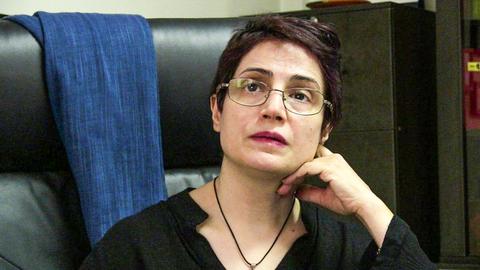In February, the Vahdat Theater (formerly the Roudaki opera house) staged “The House of Bernarda Alba,” one of Federico Garcia Lorca’s great tragedies.
It was directed by Ali Rafiei, who trained in France and whose style is utterly unique. He once described his staging objective as the “miracle mise-en-scène.” He does indeed achieve miracles using light and color to construct a succinct and poetic theatrical language.
The script was a translation by the late great poet Ahmad Shamloo, intentionally rendered in colloquial Persian. The dialogue was modernized by the playwright Mohammad Charmsheer, and the production was both bold and contemporary.
It was also a thinly-veiled exposition of the way Iran oppresses women.
Lately our news has been full of stories of child brides — nine- and 10-year-old girls whose parents marry them off. (Never mind that Iran’s law stipulates a girl must be at least 13 years old to marry. Our authorities turn a blind to eye inconvenient facts when it suits them.)
Also there has been a lot of coverage of the brave women who have joined the movement to take off their headscarves in public on Wednesdays, and of course of the courageous lawyers who have defended them: Nasrin Sotoudeh and Narges Mohammadi.
Ali Rafiei understood perfectly how timely his production was, and how certain subversive touches would resonate with Tehran audiences.
The play, in three acts, is set in Andalusia in Spain. All the action takes place inside the house of the eponymous Bernarda Alba, the widowed mother of six daughters, and above all an obstinate tyrant.
Of course everyone in the audience got the parallel instantly – Bernarda Alba as Iran’s Supreme Leader.
In Act One, the six girls’ grandmother sings a lullaby. Shamloo prolongs the final chorus so it becomes the bleating of sheep. Once again, the audience understood immediately. The sheep recalled Bernarda’s daughters tyrannized by their mother in the play, but by extension all girls – especially child brides – forced to submit to Iran’s clerical despots.
There were other allusions. The cynical maid, La Poncia, understands that Bernarda Alba is obstinate and cruel but has no power to influence her. I am not the only one who saw this as a sly reference to Iran’s impotent intellectuals and reformists. Pointedly, La Poncia is unable to protect the rebellious youngest daughter Adela, or to prevent her suicide.
As for the suicide.... Rafiei’s staging has Adela hang herself at harvest time in among piles of baled hay. It was a clear reference to the stifling effect of tradition and hidebound custom.
Frankly, I put off writing this review for a few weeks for fear of drawing the attention of the censors. I didn’t want the play shut down – as has happened to so many other fine productions. The censors swing into action the minute they think a play will stimulate anti-theocratic criticism, especially if it’s drawing big audiences. Sometimes they ban shows before they even start!
Fortunately this one completed its run without attracting any Islamo-political outrage.
It’s the third time Rafiei has pulled this off. He directed equally provocative productions of Lorca’s two other great tragedies without setting off alarms in the censor’s office.
Tehran’s theater lovers thank you.
PS: The reformist magazine Tajrobeh gave the play an excellent review and noted that its theme was dokhtar kushi, or girl-slaying. The critics clearly had their subversion antennae up too.
visit the accountability section
In this section of Iran Wire, you can contact the officials and launch your campaign for various problems




















comments